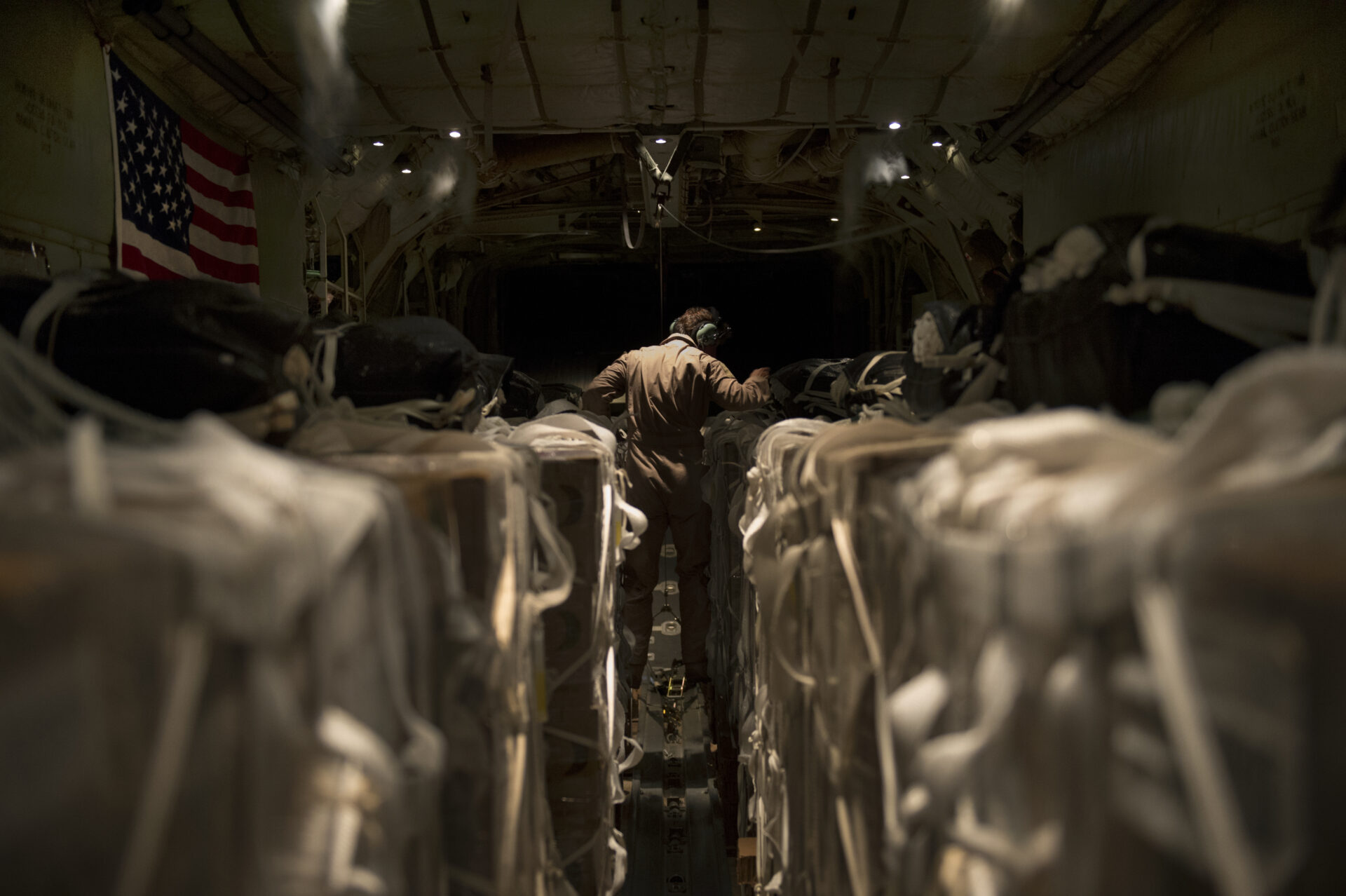“Adults in a Room” is a series in collaboration with The Stimson Center’s Reimagining US Grand Strategy program. The series stems from the group’s monthly networking events that call on analysts to gather virtually and hash out a salient topic. It aims to give you a peek into their Zoom room and a deep understanding of the issue at hand in less than the time it takes to sip your morning coffee without the jargon, acronyms, and stuffiness that often come with expertise.
The 20th anniversary of the US invasion of Iraq provided the impetus for many to look back at the fateful decision to launch what would prove to be a calamitous war. While some of the war’s champions provided various justifications for their cheerleading of the invasion in 2003, public sentiment has shifted sharply from broad enthusiasm for the war to widespread disapproval.
How did the United States find itself launching a war that, in hindsight, would seem so obviously disastrous? The Reimagining US Grand Strategy program’s March 2023 roundtable brought experts together to discuss the lessons from the US invasion of Iraq. Participants highlighted the role of the media in promoting the outright lies of the George W. Bush administration, the lack of a process in the administration for planning what would come after the toppling of Iraq’s President Saddam Hussein, and the failures of the US military to learn from its past. While the group agreed that the invasion of Iraq was a generational mistake that hurt US standing in the world, there was disagreement about whether policymakers had learned any lessons from it, especially when considering what currently shapes professional military education and allies’ perception of the US invasion.
Four experts share what they believe are the main lessons from the war in Iraq and discuss whether the United States might repeat them again.
Paul R. Pillar, Nonresident Fellow, Georgetown University
The mistaken nature of some of the assumptions underlying the launching of the Iraq War seems painfully obvious today, especially in light of the costly and messy conflict that followed. Certain realities that underlay the mess, such as the power of sectarian identities and the limitations of what military force can accomplish, may now be — because of the painful experience of the Iraq War itself — more widely recognized than they were in March 2003. In that sense, some lessons from the war could be said to have been learned. But there was enough insight available, both inside and outside government, before the war began that the Bush administration should have applied before making the decision to invade Iraq.
The mistaken nature of some of the assumptions underlying the launching of the Iraq War seems painfully obvious today, especially in light of the costly and messy conflict that followed.
The truth is that past lessons never had a chance to be applied because no policy process preceded the decision to invade. There was no policy options paper, no National Security Council meeting, or any other procedure or instrument devoted to fully and carefully considering whether launching the war was a good idea. The absence of such a process before an action as momentous as initiating a major offensive war is astounding, but the significance of this failure is still not widely recognized and represents a lesson largely unlearned.
The absence of careful consideration in the executive branch was not corrected by Congress, which authorized the use of military force with little debate and no committee hearings, or by a public that was in no mood to ask skeptical questions. On the contrary, the public mood in the wake of the 9/11 terrorist attacks was one of outrage and anger at foreign foes in general. Emotion dominated reason. An aroused American public had little patience for considering the pros and cons of a proposed war and instead wanted a cathartic strike at foreign enemies while being primed for swallowing falsehoods that blurred the distinction between those enemies, such as the notion that Saddam was behind 9/11.
An implication is that no matter how much lessons about such things as regime change and the efficacy of military force get absorbed in sober moments, what matters is whether such lessons get remembered and applied at moments when major decisions are being taken. They will not be applied if bureaucratic mechanisms for applying them do not get used (such as Congress’ lack of scrutiny), or if traumatic events once again cause emotion to push aside reason.
Kelly Grieco, Senior Fellow, Stimson Center
Twenty years ago, the United States launched its ill-fated invasion of Iraq. A long and bloody occupation and sectarian conflict followed, taking a grave toll on the Iraqi people, as well as the US servicemembers and veterans who fought there. The war in Iraq shaped a generation of US military officers. They may have first gone to war in Iraq as young lieutenants, and they are now senior officers and commanders. This generation — like the Vietnam generation — has not experienced victory. What have they learned over these past two decades of war? What did they take away to avoid repeating the same mistakes? These are painful and often uncomfortable questions to ask and answer. It is easier to forget, move on to near-peer conflict, and write off the Iraq war as an aberration.
Unfortunately, the US military, on the whole, seems to be headed in this direction. Professional military education (PME) — the staff and war colleges — ought to take up this challenge. But in the mad dash to a new Cold War with China and Russia, great power competition and conventional warfare are in the curriculum, and the war in Iraq is mostly out.
In the mad dash to a new Cold War with China and Russia, great power competition and conventional warfare are in the PME curriculum, and the war in Iraq is mostly out.
What’s even more troubling is that there is very little discussion of what went wrong — that is, beyond blaming civilian leaders for their lack of judgment and commitment. As someone who taught in PME for just under a decade, blaming civilian leaders is a tired trope and one that all too conventionally shields the military, specifically the “Petraeus generation of generals,” from any criticism. Many military officers, having borne the price of these decisions, want to have these difficult conversations. But the services seem to have little enthusiasm for thinking deeply about the last 20 years, especially the difficult military decisions made in the war.
The nature of war is enduring — whether such wars are fought between great powers or between state and non-state actors, or whether the strategies and tactics employed are conventional or irregular warfare. It would be a mistake to think that because the United States has turned its attention back to strategic competition it is best to look forward rather than backward. “Know thy self, know thy enemy,” Sun Tzu famously advised. In setting their sights ahead, senior US military leaders have directed the staff and war colleges to update their curriculum to know the Chinese and Russian militaries. In avoiding the careful study of the war in Iraq, it risks not fully knowing itself.
The war in Iraq still has many lessons to teach, if only the US military will study and learn from them.
Julian Mueller-Kaler, Deputy Director, Stimson Center Strategic Foresight Hub
Unforgettable are the former German foreign minister’s words at the Munich Security Conference in 2003, when he looked at Secretary of Defense Donald Rumsfeld, switched to English, and said that in a democracy, you have to make the case. Joschka Fischer’s “I am not convinced” became the symbol of Germany’s objection to the Iraq war.
While the decisions of Berlin and Paris to not join the coalition of the willing were later praised as pinnacles of their countries’ foreign policy, Bush’s “Operation Iraqi Freedom” under false pretenses severely damaged US credibility and leadership potential for the 21st century.
While US and allied soldiers, as well as Iraqi civilians, suffered from bombs, terror attacks, and disintegrating state structures, the political architects of the war effort faced no accountability whatsoever. Washington just moved on.
One could go even a step further and argue that observing the United States undermine the rules-based order it claimed to protect gave every incentive to countries like China and Russia to acquire an equally powerful position in the international system, able to break the rules when deemed convenient. Somewhat pursuant to George Orwell’s “Animal Farm” narrative that everybody is equal, yet some are more equal than others.
Bush’s infamous words that “when it comes to our national security, we really don’t need anybody’s permission” were thereby particularly problematic. First, nobody in their right mind could have argued that Iraq posed a severe threat to US national security, even if the country had weapons of mass destruction. Second, and even more importantly, his subjective evaluation became a pretext for future violations of international law due to alleged “self-defense.”
Undermining the very rules you eagerly claim to uphold doesn’t make for a strong foundation of credible leadership on the world stage. And while US and allied soldiers, as well as Iraqi civilians, suffered from bombs, terror attacks, and disintegrating state structures, the political architects of the war effort faced no accountability whatsoever. Washington just moved on. Even more remarkable is the fact that many of the responsible decision-makers have resurfaced as political advisors and commentators, often portraying themselves as the loudest advocates for US leadership in defense of the liberal international order.
The damage, however, is irrevocable, and large parts of the world today denounce American hypocrisy. When future historians will have to date the beginning of a post-western world, they might look no further than what the United States did 20 years ago.
William Walldorf, Jr., Associate Professor, Wake Forest University and Non-Resident Fellow, Defense Priorities
It’s cynical but true: domestic politics usually play an important role in decisions by leaders of the United States to launch major wars, including the 2003 Iraq War. In 1950, reelection concerns were a big reason for President Harry Truman’s reluctant decision to send troops across the 38th parallel in the Korean War. Along with his domestic agenda, similar concerns pressed President Lyndon Johnson to escalate militarily in Vietnam in 1964 and 1965. Similarly, domestic politics stood front and center for Bush (along with many others, like House Minority Leader Richard Gephardt (D-Mo.) and Senator Hillary Clinton (D-N.Y.)) with the 2003 decision to invade Iraq.
In the case of Iraq, the trauma of the 9/11 terrorist attacks generated a powerful new strategic narrative of counterterrorism. The imperative to look “tough on terrorism” saturated the national discourse and contributed to the Iraq war in two important ways.
It’s cynical but true: domestic politics usually play an important role in decisions by leaders of the United States to launch major wars, including the 2003 Iraq War.
First, politics around the narrative helped turn Bush’s attention to Iraq. In January 2002, the Bush administration decided to make its tough-on-terrorism record the central plank in the that year’s midterm elections. By spring 2002, Bush’s image on terrorism was taking a beating. Democrats and many in the media hammered the administration over both a failed 2001 chance to get al-Qaida leader Osama bin Laden and revelations that the administration missed warning signs about the 9/11 attacks. Bush’s poll numbers slipped. Worried about lost “political protection” from the fight against terrorism, advisor Karl Rove and others turned their attention to Iraq.
Painting Iraq as the natural next step in the war on terror, Bush used getting rid of Saddam’s imagined weapons of mass destruction program to shore up his (and Republican’s) antiterrorism image at home. In the end, Bush wed his fortunes so tightly to an Iraq-terrorism nexus that he boxed himself in politically. “I have to do this,” he told Secretary of State Colin Powell just before the war.
Second, narrative pressure to look tough on terrorism made Congress (especially the Democratic Party) a docile enabler of the Iraq War. Congress rolled over on its oversight duties and gave the Bush administration a pass on the questionable intelligence linking Iraq to weapons of mass destruction and al-Qaida. Why? Again, it’s related to the politics around the antiterrorism narrative. “The top Democrats were at their weakest when trying to show how tough they were,” said Senator Lincoln Chaffee (R-R.I.), an opponent of the war. “They were afraid that Republicans would label them soft in the post-September 11 world.” Potential Democratic presidential candidates in 2004 all voted for the war, and some, like Gephardt (D-Mo.), were among the most vocal advocates for the Authorization for Use of Military Force (AUMF) against Iraq on Capitol Hill.
Were domestic politics the only cause of the Iraq War? No, hubris and US military predominance mattered too. Still, without the narrative politics produced by 9/11, it is hard to see this war ever happening. And, if US leaders and citizens have learned nothing about themselves from the experience of the 9/11 attacks and the invasion of Iraq, something very similar could easily happen again.





















